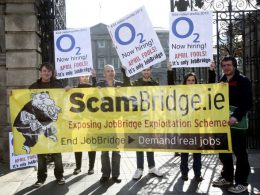The ESB staff pension fund has a €2 billion deficit. In putting forward new pension proposals management and the group of unions (GOU) argue that there are three main factors for the pension deficit. The stock market crash, wage inflation (i.e. pay rises) and because “We are all living much, much longer.” The stock market crash has played a role in exasperating the deficit. Also some people are living longer, but it depends hugely on where you live, the type of job you worked at and the age and circumstances in which you retire.
Deliberately, no mention is made of the colossal impact that voluntary redundancies and the non replacement of staff has had on the pension fund. Voluntary redundancies have been a curse for existing ESB workers – good well paid unionised jobs have been replaced by sub contractors and on top of this the pension fund is now in crisis.
In 1981 when the two pension schemes amalgamated there were five staff members for every pensioner. This meant that for every pound that was paid into the scheme only 50p was paid out. However, after years of voluntary redundancies and the replacement of staff with contractors there are now more pensioners in the ESB than there are staff working .This means that for every euro paid into the pension scheme now, approximately €2 is being paid out.
This situation is set to get worse with an average age of 50 in the company. Despite this all new staff are to be excluded from the existing pension scheme and will instead go into a defined contribution scheme.
Other measures agreed between the group of unions and management include an extended pay freeze until 2012, extended pension freeze until 2014, different rates of pay for new staff, CARE method of calculating pension and the breaking of the link with pensions to pay.
If accepted pensions will in future be linked to the consumer price index (CPI) but with an upper limit of 4%. With inflation this could render a pension worthless and the vast majority of ESB workers are not eligible for a state pension. Over 10 years the ESB will pay €591 million into the pension fund which is far less than the €1.46 billion they splashed out to buy Northern Ireland Electricity over the weekend. Disgracefully of the three big unions only the ESBOA are recommending rejection and UNITE and TEEU who have given no recommendation are de facto arguing for the deal.
The government are determined to ring fence the amount of money that has to be set aside to pay ESB pensioners into the future. Why? In order to protect future profits with an eye towards privatisation. And the profits in the ESB are not inconsiderate. In 2006 ESB made a profit after tax of €223 million, the following year this jumped to €432 million and in 2008 the profits would have been €603 million except for a one off general subsidy. The profits will be even greater when the upgrades stop, releasing billions more.
Big business is dripping at the mouth waiting to get their hands on these profits and the government are keen to oblige. Last year, while the pension negotiations were taking place, the ESB government handed €176 million rebate to a group of fewer than 60 large and multinational firms. This, in effect, was a subsidy from small businesses and domestic consumers to these large electricity users. Confident of their position the government announced a review group to look at the privatisation of semi state companies, including parts of the ESB, even before the ballot has started.
What is the alternative?
WORKERS AT Shannon Airport Development Authority fought and won a ten year campaign to have the state guarantee their pension payments. In France over 2 million workers marched to defend their pensions while in Spain 2 million public sector workers took strike action to stop pension reform and austerity measures.
Staff and pensioners in the ESB should not be made to bear the cost of government policy, where the government took a strong and healthy company and turned it a shadow of its former self, all the while nurturing profits for competitors.
ESB workers should vote no and reject this rotten deal, which basically worsens conditions and stores up problems for the future. Then we can get down to the business of discussing how we can wage a united campaign to force the company and the government to protect our pensions.











